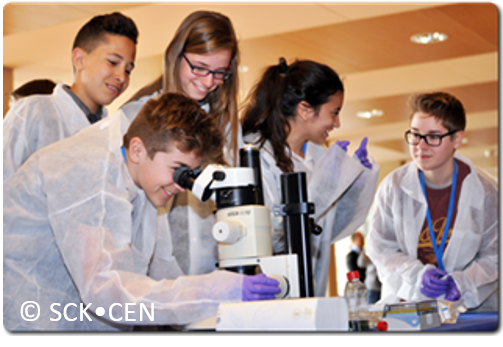Towards next-generation protein kinase D2 targeting anti-cancer therapeutics

Category
Ph D Defense
Date
2025-07-01 17:00
Venue
KU Leuven, O&N IV, Auditorium, 04.330 - Herestraat 49, 3000 Leuven
Belgie
Belgie
Promovendus/a: Olivia Appelmans
Promotor(en): Prof. dr. Arnout Voet, Prof. dr. Johan Van Lint
Cancer has touched many lives, including those of family members or friends. This disease is causing nearly 10 million deaths per year, highlighting the major challenge of curing cancer. Due to limited effectiveness of curative methods, the focus has shifted towards therapy when surgery is not feasible. Despite many years of research to fight cancer, scientists are still searching for better treatments. The road to improved therapies starts with the understanding of the underlying mechanisms of cancer. Cancer is a very complex disease, which can start in almost any organ or tissue in our body. Moreover, the onset of cancer is not caused by one specific factor, but is related to various processes or factors inducing uncontrolled growth of cells. One group of these factors are protein kinases, which act as on/off switches for many vital functions and processes in our body, helping to maintain balance. When the function of a kinase is disrupted, it can throw vital processes in the body out of balance, potentially leading to the development of diseases, like cancer. The role of many different protein kinases in cancer has been studied extensively. One family of protein kinases, the protein kinase D family, emerged as a dominant player due to its diverse roles in cellular signaling. Improper functioning of these kinases is associated with the development and growth of multiple cancer types, underscoring the pivotal role of PKDs as a cancer target. This PKD family consists of three closely-related members (PKD1, PKD2 and PKD3), functioning in their own uniquely manner. PKD1 has generally been described to function as a tumor suppressor, while PKD2 and PKD3 often exhibit an oncogenic role. This thesis focuses on PKD2 as the primary target of research, aiming to suppresses its cancer driving activity. The search for improved cancer therapeutics started with the identification and validation of more selective PKD inhibitors. Our objective was to specifically suppress the activity of PKD2, while ensuring that PKD1 and PKD3 remain unaffected, in order to prevent disrupting other essential biological processes. To achieve this goal, we identified a small group of five compounds that should glue two parts of PKD2 together and thereby prevent its harmful functioning. In the course of our work, we encountered an unexpected shortage of P81 paper, an essential component of the golden-standard radiometric kinase assay. We have validated LSA-50 paper as a valid alternative. Many targeted therapies are initially effective in treating cancer, but resistance often arises due to mutations in the therapy’s target. We identified and characterized five mutations in PKD2 to understand their impact on PKD2 activity, cell proliferation, cell signaling, transcriptome (gene activity), PKD2 interactors, cell migration and cell adhesion.All Dates
- 2025-07-01 17:00
Powered by iCagenda





